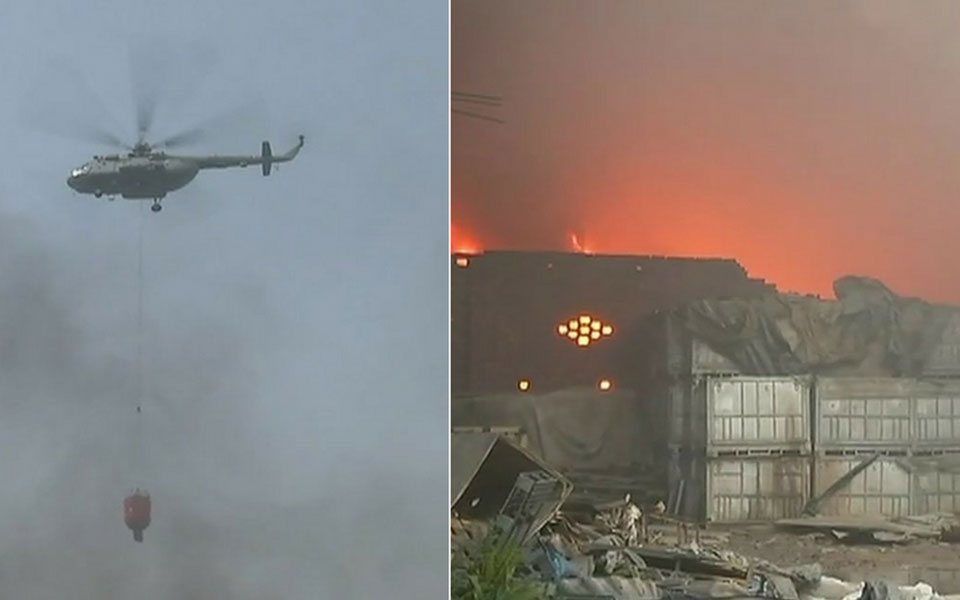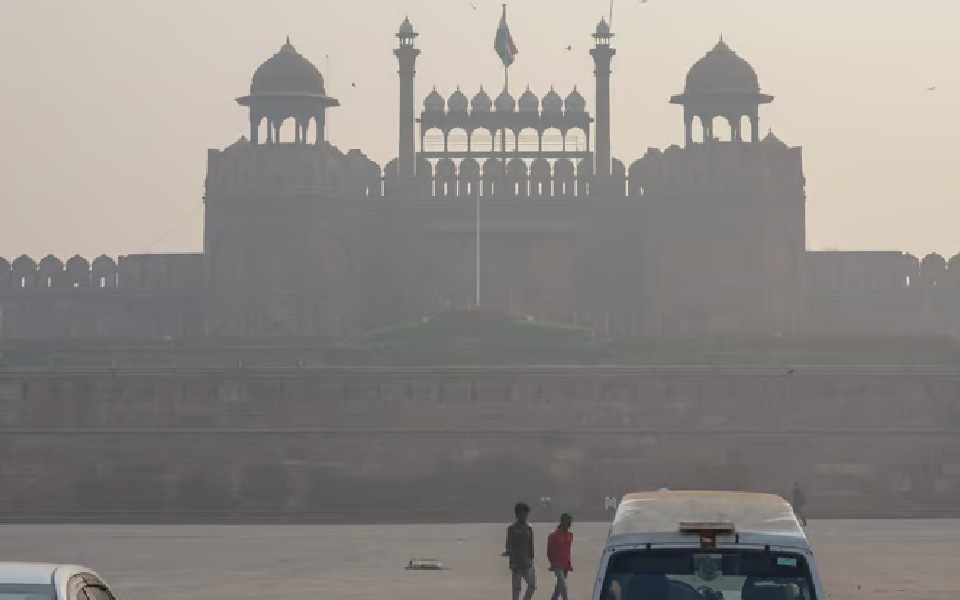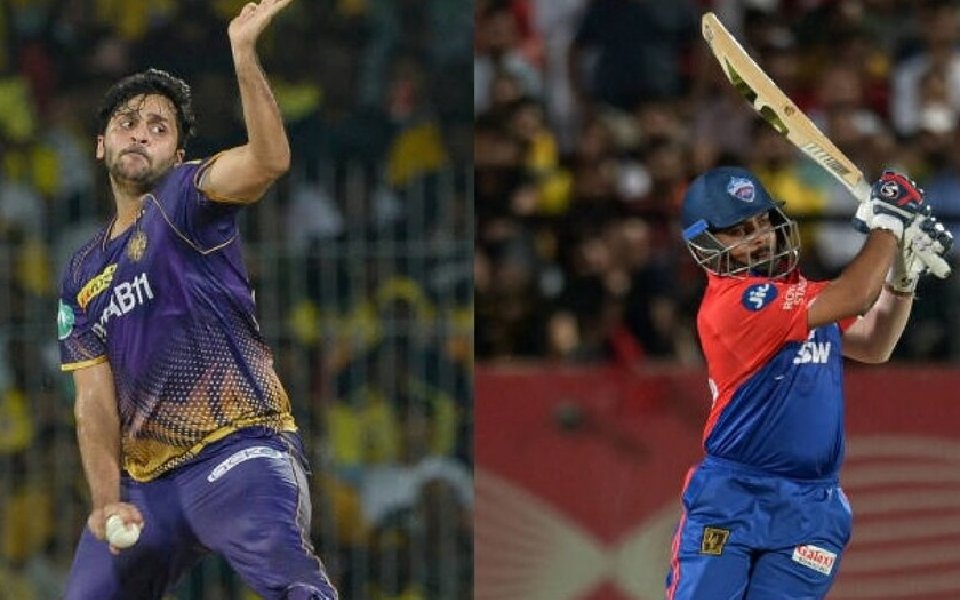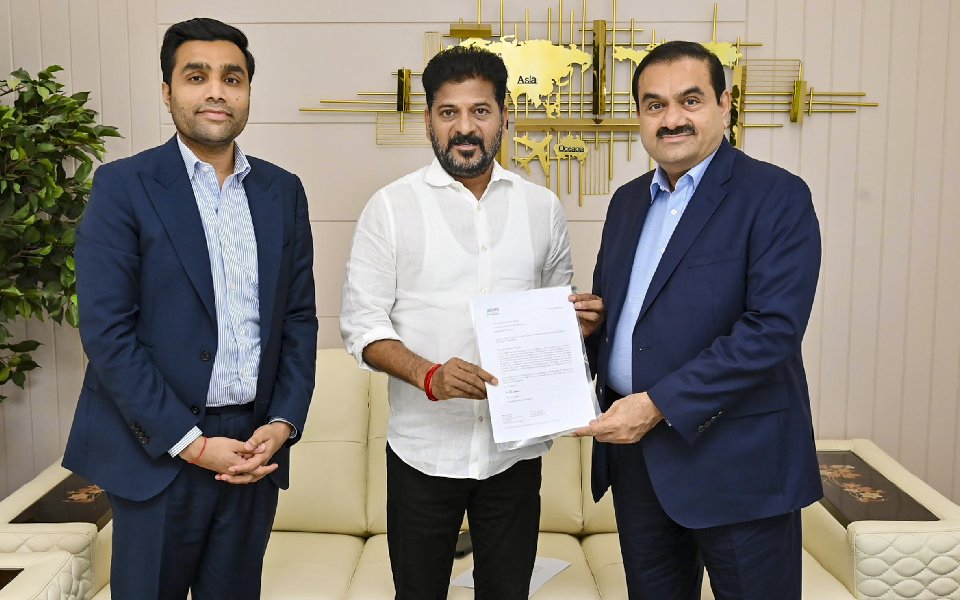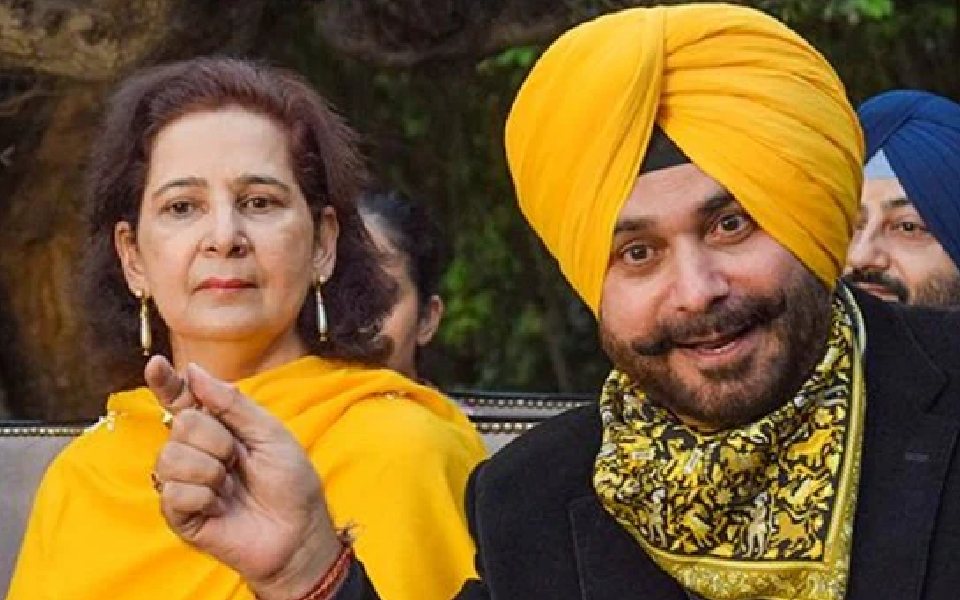New Delhi, May 30: A massive blaze that erupted in a rubber factory of a densely-populated south Delhi neighbourhood last evening was brought under control on Wednesday after an Indian Air Force (IAF) Mi17V5 chopper was used to spray water, officials said.
Strong winds on Tuesday night fanned the flames emanating from the warehouse storing rubber as it took a gigantic proportion. The IAF chopper fitted with a bambi bucket had to carry out many sorties, spray hundreds of litres of water to wrestle the blaze under control.
Fire officials said the blaze will be contained only once the material burns which may take around three more hours. They said there were no casualties reported so far. The cause of it was still being ascertained.
On Tuesday evening, 65 tenders, parked in the byzantine lanes of the congested neighbourhood, were put in service to douse the blaze in the Khirki Extension of Malviya Nagar. Five tenders were used to fight the fire with foam.
A fire official told here that a call reporting the fire near Sant Nirankari School was received around 5 p.m.
The warehouse is owned by Maxwell Pvt Ltd who are into business of providing rubber raw material for remoulding of vehicle tyres.
Deputy Commissioner of Police, South, Romil Baaniya said it was found that a truck was being loaded with rubber sheets at the warehouse when the vehicle suddenly burst into flames. It quickly spread to the building where more rubber sheets were stored.
Rubber compounds stored in inflammable metallic and plastic boxes caught fire that flared up the blaze.
The officer said the fire was partially brought under control in the evening. But as it became windy during the night, flames gushed out of the building and a plume of black smoke clouded the Malviya Nagar skyline.
People living around the warehouse was evacuated as a preventive measure. Some 13 buildings, a school and a gym have been evacuated for safety reasons, according to a fire department statement.
"The nearby area has been temporarily evacuated for security reason," Baaniya said.
Medical teams at Max Saket, Rainbow Child Specialty Hospital, Safdarjung Hospital and AIIMS were kept on alert to attend to any injured. Adequate police arrangements were deployed at the medical facilities.
Policemen and women were also deployed in large numbers for assisting in the evacuation, crowd control and coordination with other agencies.
Let the Truth be known. If you read VB and like VB, please be a VB Supporter and Help us deliver the Truth to one and all.
New Delhi, Nov 25: Delhi's air pollution levels remained alarming on Monday, with the capital's 24-hour average AQI reading soaring to 349 from 318 the previous day, even as the Supreme Court slammed the city government and police for a "serious lapse" in implementing GRAP curbs.
The apex court, however, asked the central pollution watchdog to consider restarting physical classes in the schools and colleges of Delhi-NCR, noting that students are being deprived of mid-day meals and lack the wherewithal to attend virtual classes.
According to the SAMEER app, which offers hourly updates on the National Air Quality Index, the AQI was recorded at 218 at 9 am, but it rose to 377 at 7 pm, thanks to a low wind speed.
Seven of the 38 air quality-monitoring stations in Delhi reported AQI levels in the "severe" category at 5:30 pm, with the number rising to 14 at 7 pm.
The latest data from the Central Pollution Control Board (CPCB) said Delhi's 24-hour average AQI, recorded at 4 pm, stood at 349.
Bhavreen Kandhari, an environmentalist, said the AQI has risen due to a combination of stagnant winds that have a speed of less than 10 kilometres per hour and dropping temperatures that trap pollutants close to the ground.
The CPCB categorises the AQI as follows -- 0-50 (good), 51-100 (satisfactory), 101-200 (moderate), 201-300 (poor), 301-400 (very poor), 401-450 (severe) and above 450 (severe plus).
Last week, the city endured its highest recorded AQI for the season, reaching a hazardous 495, prompting the implementation of the Stage-4 restrictions under the Supreme Court-mandated Graded Response Action Plan (GRAP) to curb pollution.
On Monday, the primary pollutant contributing to the deteriorating air quality was PM2.5, with levels recorded at 166.9 micrograms per cubic metre at 4 pm.
These fine particulate matters with a diameter of 2.5 micrometres or less, pose severe health risks as these can penetrate deep into the lungs and enter the bloodstream.
The drop in the air quality follows a week of hazardous levels of pollution, with Delhi's AQI surpassing 450 for the first time this season last Sunday morning.
Although the air quality improved slightly on Thursday and Friday, it worsened again on Saturday, with the AQI returning to the "severe" category.
As evening descended on Monday, a thick layer of mist and smog covered the city, reducing visibility and exacerbating the air-quality crisis.
Meanwhile, the Supreme Court asked the Commission for Air Quality Management (CAQM) to consider restarting physical classes in schools and colleges in the National Capital Region (NCR) and adjoining areas, noting that students are being deprived of mid-day meals and lack the wherewithal to attend virtual classes.
The restrictions on physical classes in schools and colleges were imposed recently due to severe air pollution.
The court censured the Aam Aadmi Party (AAP) government and Delhi Police for a "serious lapse" on their part in strictly implementing the GRAP-4 measures, and directed the CAQM to take action against the erring officials.
A bench of Justices Abhay S Oka and Augustine George Masih said the authorities have made no efforts to implement the GRAP-4 measures.
"It is apparent that the authorities mentioned in GRAP-IV clauses 1, 2 and 3 have made no earnest efforts to implement action under clauses 1 to 3. Some police teams were deputed at a few entry points, that also without any specific instructions," it said.
The Centre's Decision Support System (DSS) for Air Quality Management estimated that vehicular emissions contributed 16.4 per cent to Delhi's pollution on Monday. Stubble burning, another major factor, accounted for 11 per cent of the capital's pollution on Sunday.
The DSS provides daily estimates for vehicular emissions, while the data on stubble burning is typically released the following day.
Meanwhile, the daytime temperature was recorded at 25.8 degrees Celsius, 0.9 notches below the seasonal average, the India Meteorological Department (IMD) said.
Humidity levels fluctuated between 85 per cent and 68 per cent during the day.
The IMD has forecast moderate fog for Tuesday, with the maximum and minimum temperatures likely to hover around 26 degrees Celsius and 12 degrees Celsius respectively.

